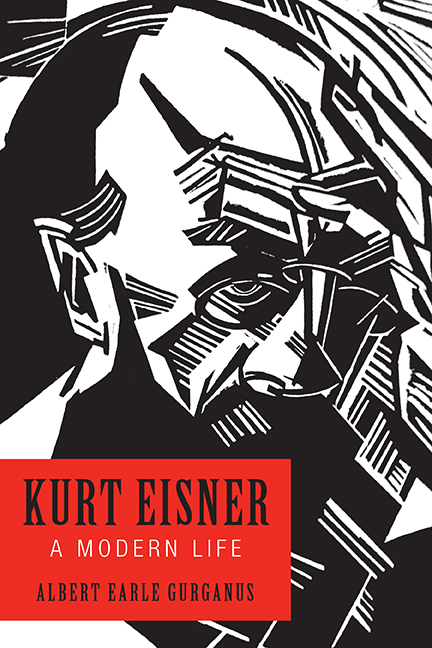Book contents
- Frontmatter
- Dedication
- Contents
- Acknowledgments
- Introduction
- 1 A Novel's Suffering Hero: A Youth in Berlin (1867–1889)
- 2 Aristocratize the Masses: From Berlin to Frankfurt to Marburg (1890–1893)
- 3 Refuge of All Idealists: Through Cohen to Kant toward Marx (1893–1896)
- 4 Dictatorial Megalomania: Lèse Majesté and Plötzensee Prison (1896–1898)
- 5 Making the Leap: Back to Berlin as a Social Democrat (1898–1900)
- 6 No Idle Dreamer: At the Helm of Vorwärts (1900–1902)
- 7 My Life's Purpose: Molding the Readership (1902–1903)
- 8 Never ... a Less Fruitful Scholastic Debate: Intramural Strife—Evolution vs. Revolution (1903–1905)
- 9 Revolutionizing Minds: The Scorched Middle Ground (1905)
- 10 The Complete Parity of My Experiences: From Exile to Nuremberg (1905–1907)
- 11 The Most Genuine and Fruitful Radicalism: Taking the Lead at the Fränkische Tagespost (1907–1908)
- 12 So Suspect a Heretic, as Surely I Am: New Bearings in North Bavaria (1908)
- 13 Dear Little Whore: Personal and Professional Turmoil (1909)
- 14 To Find a Lost Life: From Nuremberg to Munich (1909–1910)
- 15 Something of a Party Offiziosus in Bavaria: Political Editor at the Münchener Post (1910–1911)
- 16 At Peace with Myself: Resettling into Family Life (1912–1913)
- 17 The Powerlessness of Reason: The World War Erupts (1914)
- 18 Wretched Superfluity: Divided Loyalties (1915–1916)
- 19 War for War's Sake: Political Alienation and Realignment (1916–1917)
- 20 The Most Beautiful Days of My Life: Leading the Opposition (1917–1918)
- 21 Our Power to Act Now Grows: From Prisoner to Premier (1918)
- 22 The Terror of Truth: Forging the Republic, Combatting Reaction (1918)
- 23 The Fantasies of a Visionary: Martyr of the Revolution (1918–1919)
- 24 Now Dead, as It Stands: Outcomes and Legacy (1919–2017)
- Abbreviations
- Notes
- Sources and References
- Index
- Frontmatter
- Dedication
- Contents
- Acknowledgments
- Introduction
- 1 A Novel's Suffering Hero: A Youth in Berlin (1867–1889)
- 2 Aristocratize the Masses: From Berlin to Frankfurt to Marburg (1890–1893)
- 3 Refuge of All Idealists: Through Cohen to Kant toward Marx (1893–1896)
- 4 Dictatorial Megalomania: Lèse Majesté and Plötzensee Prison (1896–1898)
- 5 Making the Leap: Back to Berlin as a Social Democrat (1898–1900)
- 6 No Idle Dreamer: At the Helm of Vorwärts (1900–1902)
- 7 My Life's Purpose: Molding the Readership (1902–1903)
- 8 Never ... a Less Fruitful Scholastic Debate: Intramural Strife—Evolution vs. Revolution (1903–1905)
- 9 Revolutionizing Minds: The Scorched Middle Ground (1905)
- 10 The Complete Parity of My Experiences: From Exile to Nuremberg (1905–1907)
- 11 The Most Genuine and Fruitful Radicalism: Taking the Lead at the Fränkische Tagespost (1907–1908)
- 12 So Suspect a Heretic, as Surely I Am: New Bearings in North Bavaria (1908)
- 13 Dear Little Whore: Personal and Professional Turmoil (1909)
- 14 To Find a Lost Life: From Nuremberg to Munich (1909–1910)
- 15 Something of a Party Offiziosus in Bavaria: Political Editor at the Münchener Post (1910–1911)
- 16 At Peace with Myself: Resettling into Family Life (1912–1913)
- 17 The Powerlessness of Reason: The World War Erupts (1914)
- 18 Wretched Superfluity: Divided Loyalties (1915–1916)
- 19 War for War's Sake: Political Alienation and Realignment (1916–1917)
- 20 The Most Beautiful Days of My Life: Leading the Opposition (1917–1918)
- 21 Our Power to Act Now Grows: From Prisoner to Premier (1918)
- 22 The Terror of Truth: Forging the Republic, Combatting Reaction (1918)
- 23 The Fantasies of a Visionary: Martyr of the Revolution (1918–1919)
- 24 Now Dead, as It Stands: Outcomes and Legacy (1919–2017)
- Abbreviations
- Notes
- Sources and References
- Index
Summary
IN NOVEMBER 1918 in the Catholic stronghold of Munich a transplanted Jewish Berliner, just released from prison, led a nonviolent revolution that deposed the ancient Wittelsbach dynasty and established the Bavarian Republic, effectively ending both the Second German Empire and the First World War. The local head of the breakaway Independent Socialists, Kurt Eisner, had been jailed for treason in February after organizing a munitions workers’ strike to force an armistice. Before his incarceration he served as arts critic for the Münchener Post, organ of the Social Democratic Party, having been demoted from political editor for opposing the war. For a hundred days as Germany spiraled down into civil war and the victorious Entente powers deliberated their vengeance, Eisner fought as head of state to preserve calm in the South while implementing a peaceful transition to democracy and reforging international relations. On 21 February 1919, on the way to submit his government's resignation to the newly elected constitutional assembly, he was shot by a protofascist aristocrat. The senseless murder shattered a tenuous equilibrium, plunging Bavaria into the political chaos from which Adolf Hitler would emerge to herald a new epoch—one that culminated in 1945 with the citizenry of Dachau, their faces clouded by complicit ignorance and worse, burying the concentration camp dead on orders from its American liberators.
For many mired in the tradition of Catholic, monarchist Bavarian politics, including the resident Majority Social Democratic leadership, it was unthinkable that a diminutive Prussian intellectual of mosaisch heritage could mount an uprising that toppled one of Europe's most fixed ruling houses literally in an afternoon. But during the war an influx of North German labor had been channeled to Munich to drive the armaments industry, significantly radicalizing the urban proletariat. At the height of the British blockade the Wittelsbachs stood accused of war-profiteering by selling goods from the royal Leutstetten dairy at inflated prices. The western front was breached, the German Army in retreat, and still the very parties that championed the kaiser's preserve called for a levée en masse for national defense. People were war-weary, hungry, disillusioned, malcontent.
Information
- Type
- Chapter
- Information
- Kurt EisnerA Modern Life, pp. 1 - 6Publisher: Boydell & BrewerPrint publication year: 2018
